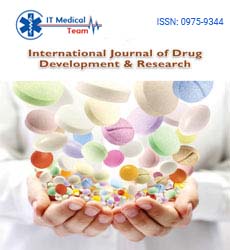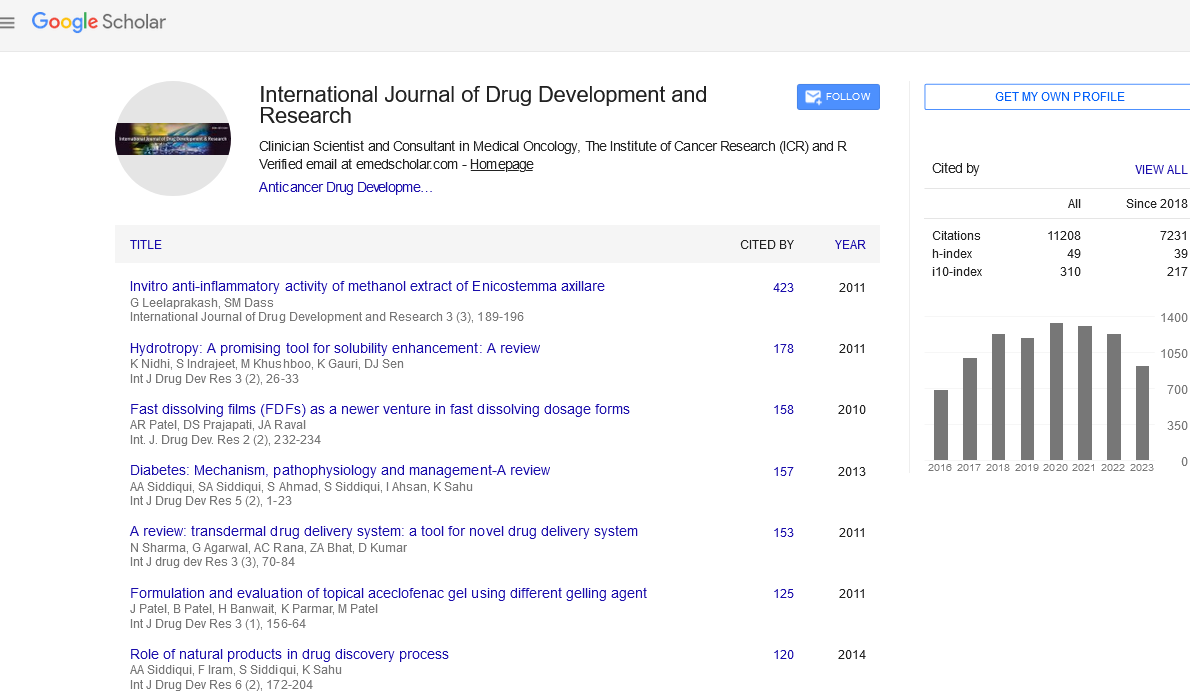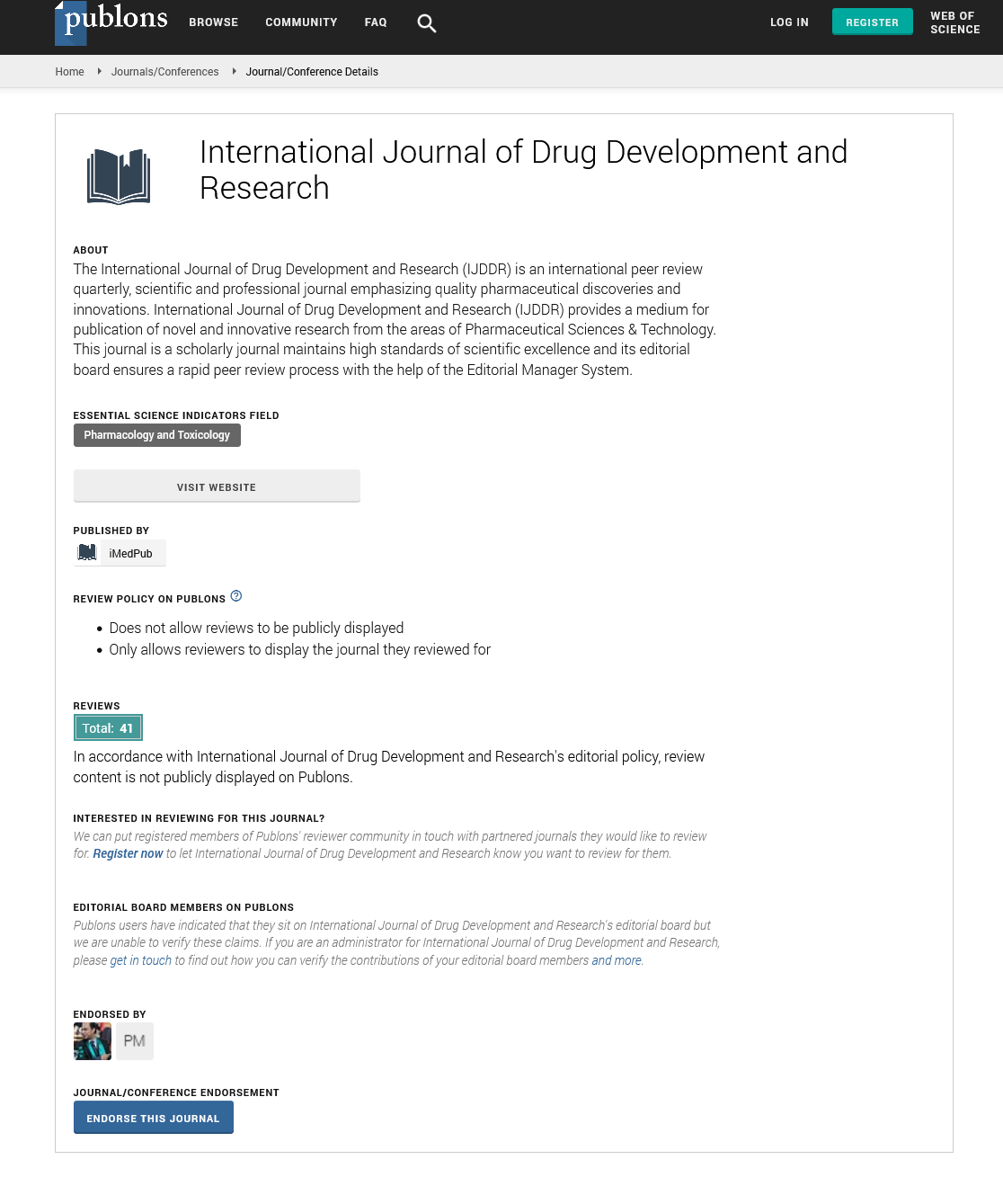Opinion - (2024) Volume 16, Issue 5
From Monoclonal Antibodies to CAR-T Therapy: Trends and Transformations in Cancer Treatment
Armamn Elavan*
Department of Pharmacy, University of Patra, Patra, Greece
*Correspondence:
Armamn Elavan, Department of Pharmacy, University of Patra, Patra,
Greece,
Email:
Received: 11-Sep-2024, Manuscript No. IJDDR-24-15197;
Editor assigned: 13-Sep-2024, Pre QC No. IJDDR-24-15197 (PQ);
Reviewed: 27-Sep-2024, QC No. IJDDR-24-15197;
Revised: 15-Oct-2024, Manuscript No. IJDDR-24-15197 (R);
Published:
22-Oct-2024
Introduction
The landscape of cancer treatment has been transformed by
groundbreaking advancements in immunotherapy, particularly
through the development of monoclonal antibodies and CAR-T
cell therapies. These innovations have opened new avenues for
targeted treatment, offering hope to patients with previously
untreatable cancers. This article explores the evolution from
monoclonal antibodies to CAR-T therapy, highlighting current
trends, key developments, and the future outlook of these
therapies.
Description
The evolution of monoclonal antibodies
Monoclonal antibodies (mAbs) emerged as a revolutionary
tool in the treatment of cancer during the late 20th century.
Developed through the hybridoma technology pioneered by
Georges Kohler and Cesar Milstein in 1975, monoclonal
antibodies are laboratory produced molecules designed to bind
specifically to target antigens. This targeted approach enables
precise attack on cancer cells while minimizing damage to
surrounding healthy tissue.
Mechanisms of action
Monoclonal antibodies work through several mechanisms to
combat cancer:
• Targeted therapy: mAbs can bind to specific antigens
expressed on cancer cells, marking them for destruction by
the immune system.
• Blocking growth signals: Some mAbs inhibit growth factor
receptors on cancer cells, blocking signals that promote
tumor growth.
• Immune modulation: mAbs can also engage immune cells,
enhancing their ability to recognize and kill cancer cells.
Early successes and expansions
The first monoclonal antibody approved for cancer treatment
was rituximab, targeting CD20 on B-cells in non-Hodgkin
lymphoma. Since then, the field has expanded rapidly, with numerous mAbs approved for various cancers, including
trastuzumab (Herceptin) for HER2-positive breast cancer and
cetuximab (Erbitux) for EGFR-expressing cancers. These
successes have cemented monoclonal antibodies as a
cornerstone of targeted cancer therapy.
The rise of CAR-T cell therapy
Introduction to CAR-T therapy: Chimeric Antigen Receptor T-cell
(CAR-T) therapy represents a more recent and transformative
development in cancer immunotherapy. This approach involves
engineering a patient’s own T-cells to express chimeric antigen
receptors that recognize specific cancer cell antigens. Once these
modified T-cells are reinfused into the patient, they target and
destroy cancer cells with high specificity.
Development and approval: The path to CAR-T therapy began
with early research in the 1990's, but it gained significant
momentum in the 2010's. In 2017, the U.S. Food and Drug
Administration (FDA) approved the first CAR-T therapies, Kymriah
(tisagenlecleucel) and Yescarta (axicabtagene ciloleucel), for
certain types of B-cell lymphomas. These approvals marked a
milestone in personalized cancer treatment, showcasing CAR-T’s
potential to induce durable responses in patients with otherwise
refractory cancers.
Mechanisms of action
CAR-T cells work by the following mechanisms:
Direct cytotoxicity: CAR-T cells recognize and bind to specific
antigens on cancer cells, leading to their destruction.
Activation of the immune response: CAR-T cells can stimulate
a broader immune response against the cancer by releasing
cytokines that activate other immune cells.
Current trends in monoclonal antibodies and CAR-T
therapy
Next-generation monoclonal antibodies: Advances in monoclonal
antibody technology are leading to the development of next-generation
therapies:
• Bispecific antibodies: These antibodies are engineered
to bind two different antigens simultaneously, enhancing
their ability to target cancer cells. Bispecific T-cell Engagers
(BiTEs), such as blinatumomab, bring T-cells into close
proximity with cancer cells, facilitating their destruction.
• Antibody-Drug Conjugates (ADCs): ADCs combine
monoclonal antibodies with cytotoxic drugs, allowing
for targeted delivery of chemotherapy agents directly to
cancer cells. Examples include ado-trastuzumab emtansine
(Kadcyla), used for HER2-positive breast cancer.
• Checkpoint inhibitors: Though not traditional monoclonal
antibodies, checkpoint inhibitors like pembrolizumab
(Keytruda) are designed to block proteins that inhibit
immune responses, thereby enhancing the ability of the
immune system to attack cancer cells.
Evolving CAR-T Therapies
CAR-T cell therapy is rapidly evolving, with several trends
shaping its future:
• Expansion to solid tumors: Initial CAR-T therapies primarily
targeted hematologic cancers, but research is increasingly
focusing on adapting CAR-T for solid tumors. This involves
overcoming challenges such as identifying suitable antigens
and navigating the tumor microenvironment.
• Improved safety profiles: Researchers are developing
strategies to mitigate the side effects of CAR-T therapy, such
as Cytokine Release Syndrome (CRS) and neurotoxicity.
Innovations include incorporating safety switches that can
deactivate CAR-T cells if severe adverse effects occur.
• Enhanced efficacy: Efforts are underway to enhance
CAR-T cell efficacy through combination therapies, such
as integrating CAR-T with immune checkpoint inhibitors or
other targeted therapies.
Challenges and future directions
Overcoming resistance: Both monoclonal antibodies and CAR-T
therapies face challenges related to resistance. Cancer cells
can sometimes adapt or alter antigen expression, diminishing the effectiveness of these treatments. Ongoing research aims to
address this issue by developing therapies targeting multiple
antigens or combining treatments to overcome resistance
mechanisms.
Accessibility and affordability: The high cost of CAR-T therapy
and some monoclonal antibodies poses significant challenges for
widespread adoption. Efforts to reduce costs and improve
manufacturing processes are crucial for making these therapies
more accessible to a broader patient population.
Personalized approaches: The future of cancer therapy is
likely to be increasingly personalized, with treatments tailored to
individual patients based on their unique genetic and molecular
profiles. Advances in genomics and bioinformatics will drive this
shift, enabling more precise targeting of therapies and
improving outcomes.
Conclusion
The journey from monoclonal antibodies to CAR-T cell therapy
represents a remarkable evolution in cancer treatment,
characterized by increased specificity, efficacy, and innovation.
Monoclonal antibodies laid the groundwork for targeted
therapies, while CAR-T therapy has ushered in a new era of
personalized immunotherapy with the potential to revolutionize
cancer care.
As research continues to advance, both monoclonal
antibodies and CAR-T therapies will evolve, offering new hope
and expanded treatment options for patients worldwide. The
ongoing development of next-generation therapies, coupled
with efforts to address current challenges, promises a future
where cancer treatment is more effective, accessible, and
personalized than ever before.
Citation: Elavan A (2024) From Monoclonal Antibodies to CAR-T Therapy: Trends and Transformations in Cancer Treatment. Int J Drug Dev Res Vol: 16 No:5






